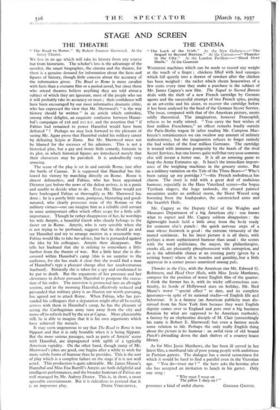STAGE AND SCREEN
THE THEATRE
■ • The Road to Rome." By Robert Emmett Sherwood. At the Savoy Theatre.
WE live in an age which will take its history from any source but from historians. The scholar's loss is the advantage of the novelist, the smart biographer, the cinema and the theatre, for there is a genuine demand for information about the facts and figures of history, though little concern about the accuracy of the information given. The Road to Rome is more cavalier with facts than a costume film or a period novel, but since those who attend theatres believe anything they are told about a subject of which they are ignorant, most of the people who see it will probably take its accuracy on trust ; their confidence will have been encouraged by our most informative dramatic critic, who has expressed the view that Mr. Sherwood's "is the way history should be written" in an article which embodies, among other delights, an exquisite confusion between Hanni- bal's campaigns of 216 and 211 B.C. and the assertion that "if Fabius had remained in power Hannibal would have been defeated " ! Perhaps we may look forward to the pleasure of seeing Mr. Agate prove that Hannibal ended his military career by defeating Scipio at Zama. But Mr. Sherwood must not be blamed for the excesses of his admirers. This is not a historical play, but a gay and ironic little comedy, fantastic in its plot, in which historical figures are introduced merely that their characters may be parodied. It is undoubtedly very amusing.
The scene of the play is set in and outside Rome, just after the battle of Cannae. It is supposed that Hannibal has fol- lowed his victory by marching directly on Rome. Rome is almost defenceless, and Fabius, who has been appointed Dictator just before the news of the defeat arrives, is in a panic and unable to decide what to do. Even Mr. Shaw would not have burlesqued Fabius so thoroughly as Mr. Sherwood has done ; he is a portly little man, pompous, blustering and good- natured, who clearly possesses none of the Roman or the military virtues—one can imagine him as a reliable civil servant in some unimportant office which offers scope for a little self- importance. Though he rather disapproves of her, he worships his wife Amytis, a beautiful Greek who clearly belongs to the faster set in Rome. Amytis, who is very sensible when she is not trying to be profound, suggests that he should go and see Hannibal and try to arrange matters in a reasonable way. Fabius would like to take her advice, but he is persuaded against the idea by his colleagues. Amytis then disappears. She tells her husband that she is retiring to somewhere a little further from the theatre of war, But a little later she is dis- covered within Hannibal's camp (this is no surprise to the audience, for she has made it clear that she would find a man of Hannibal's type a pleasant change after her unadventurous husband). Naturally she is taken for a spy and condemned to be put to death. But the arguments of her presence and her cleverness in debate persuade Hannibal to postpone the execu- tion of his Order. The interview is protracted into an all-night session, and in the morning Hannibal, effectively seduced and persuaded that military glory is an illusion not worth pursuing, has agreed not to attack Rome. When Fabius, who has per- suaded his colleagues that a deputation might after all be useful, arrives with them in Hannibal's camp, he has the pleasure of seeing the Carthaginian army turn away from the city and move off to refresh itself by the sea at Capua. More pleasurable still, he is able to imagine that it is his own arguments which have achieved the miracle.
It may seem ungenerous to say that The Road to Rome is too flippant and that it is only bearable when it is being flippant. But the more serious passages, such as parts of Amytis' scene with Hannibal, are impregnated with uplift of a typically American vapidity. On the other hand, though many of Mr. Sherwood's jokes are good, one begins after a while to wish for more subtle forms of humour than he provides. This is the sort of play which is a complete failure on the stage if it is not well acted. This production is quite admirable. Mr. James Mason's Hannibal and Miss Ena Burrill's Amytis are both delightful and intelligent performances, and the broader humours of Fabius are well managed by Mr. Aubrey Dexter. This is, in short, a most agreeable entertainment. But it is ridiculous to pretend that it




































































 Previous page
Previous page